Currently, there are more than 10 Chinese car brands operating in the Vietnamese market such as MG, Chery, Wuling, Hongqi, Haima, Haval, GAC, Aion, Omoda, Jaecoo, Lynk & Co...
Customers experience the Chinese BYD electric car line in Ho Chi Minh City on the morning of July 18 - Photo: TTD
"Have studied the Vietnamese market for more than 10 years"
BYD launched three versions including Dolphin, SUV Atto3, Seal with prices of 659 million VND; 766 - 866 million VND and 1.1 - 1.3 billion VND respectively. When the prices were announced, many people shook their heads because they were quite high compared to gasoline cars and pure electric cars in the same segment of other brands. In response to questions about the high price of the car compared to the market, Mr. Liu Xue Liang, General Director of BYD Auto Asia - Pacific , said that he had researched and consulted with partners and customers for a long time. "We have carefully studied the Vietnamese market for more than 10 years. Offering the above price in a market we consider to be important is a carefully researched move," said Mr. Liu. BYD car prices in Thailand are cheaper than in Vietnam and are compared by many customers. For example, the Dolphin in the Thai market is 394 million VND, while in Vietnam it is 659 million VND. The Atto 3 SUV in Thailand costs 563 million VND, but is being offered for 766 million VND in Vietnam. In fact, many Chinese brands are not cheap in Vietnam. The two MG4EV and Haima 7X-E models distributed in Vietnam have higher prices than Japanese and Korean gasoline and diesel models in the same segment. Due to the high price, the Haima 7X-E model recently had to reduce its price by 130 million VND to stimulate demand, but it still failed to attract customers' attention.Customers test drive BYD cars during the introduction of Chinese electric cars in Thu Duc City on the morning of July 18 - Photo: TTD
No charging station development
Many customers are also concerned about charging Chinese cars. Mr. Vo Minh Luc - CEO of BYD - said that the company has no plans to build charging station infrastructure but cooperate with other businesses or charge at the company's dealer system. In addition, car buyers can charge their cars by hand or with a 7kW wall charger at home provided by the company when buying a car. Customers also expressed concern that in large cities, most residents live in high-rise buildings and are not able to charge their cars by themselves, while waiting at public charging stations takes a long time and the car owner is not proactive about the time. Driving to the provinces is even more difficult. "Going far without a charging station, only depending on a small dealer system will be even more difficult for users. Driving and worrying about running out of battery is disappointing" - Mr. Quang Ha (Thu Duc City, Ho Chi Minh City) said. Mr. Ha believes that if they want to buy a new electric car in the Vietnamese market, users will definitely choose a car with good brand recognition, perfect service and most importantly, convenience and ease of charging when traveling long distances. Mr. Nguyen Minh Dong, director of Duc Viet Technology Consulting Company, affirmed that charging stations are the backbone of the electric vehicle industry. Charging infrastructure is a problem that needs to be solved well for electric cars to develop. Meanwhile, VinFast is holding the No. 1 position with 150,000 charging ports covering the whole country. This company continues to "pour" thousands of billions of VND into investing in expanding charging stations nationwide. According to Mr. Dong, that is the fundamental factor that determines the success or failure of an electric vehicle brand. And even though electric cars from China have better prices, without charging stations, customers will hesitate. Previously, BYD reported spending about 250 million USD to build an electric vehicle assembly plant in Vietnam, hoping for favorable conditions for investment.VinFast electric car charging station at Vincom Cong Hoa Shopping Center, Tan Binh District, Ho Chi Minh City - Photo: QUANG DINH
Pressure from imported cars
Chinese electric vehicles pose challenges and expectations in many markets. The expansion of Chinese electric vehicle manufacturers in Vietnam comes at a time of oversupply in China and a newly announced 100% tariff in the US. Many countries have implemented measures to protect their domestic markets. This concern is justified as BYD has an advantage over traditional automakers thanks to its vertically integrated supply chain. They produce almost all of their car parts themselves instead of transferring them to suppliers. Reducing the cost of batteries - the most expensive component of electric vehicles - is key. The Vietnam Automobile Manufacturers Association (VAMA) believes that Chinese automakers can produce low-cost electric vehicles imported and distributed in the Vietnamese market in the near future. Vietnam is a market with great potential as the Government 's roadmap to 2040 will limit and eventually stop the production, assembly and import of vehicles using fossil fuels. Thus, the demand for electric cars will increase sharply. Not only Chinese electric cars, VAMA representatives assessed that the pressure from imported cars on domestically assembled cars is increasing. Immediately after removing import tariffs on completely built-up cars from ASEAN in 2018, many domestically assembled products could not compete with products from countries such as Thailand and Indonesia. From 2025, when import tariffs on cars from the EU and UK are reduced to 30-35%, the advantage for domestically assembled cars will decrease further. Not only that, cheap electric cars from China flooding in will greatly affect the production and business activities of domestic automobile enterprises. Mr. Nguyen Chi Sang, Chairman of the Vietnam Association of Mechanical Industry (VAMI), said that there are currently automobile enterprises with production facilities in Vietnam that have brought electric and hybrid car models to the market and started production and assembly right in Vietnam. For example, Hyundai Thanh Cong Company with the Ioniq5 electric car model or the Santa Fe hybrid car. According to Mr. Sang, only when maintaining current production, will automobile manufacturers continue to invest in expansion to produce more, especially green car models in Vietnam, to create diversity for consumers to choose from.VinFast promotes charging station advantages
Facing the wave of Chinese electric cars, VinFast has launched a "strategy" that customers who buy VinFast cars from July 2024 to the end of July 2026 will receive free parking (under 5 hours), priority parking at locations in the Vingroup ecosystem and free battery charging for 1 year. In particular, Vinhomes residents who own VinFast electric cars can also park and charge their cars for free for 2 years at Vinhomes parking lots. In addition, Vingroup has also established FGF Company - For a Green Future to buy, sell and rent electric cars, contributing to stabilizing the price of VinFast electric cars and reducing customers' worries about car prices falling.China produces the most electric cars in the world
In April, Omoda & Jaecoo Automobile Co., Ltd., a subsidiary of Chery Group (China), also signed a joint venture contract with Vietnam's Geleximco Group, investing in an $800 million automobile manufacturing plant in Thai Binh. However, auto industry experts believe that the trend of Chinese cars is prioritizing the electric vehicle market. About 10 years ago, Chinese cars had no place in the world auto market. When the world auto industry began a new chapter with the electrification race, Chinese cars changed. China is now the country that produces the most electric cars in the world, and also exports the most in the world. According to the latest data, in the first five months of 2024, BYD firmly maintained its position as the leading brand in the number of new energy vehicles sold globally with 1,191,478 vehicles and continuously broke sales records. In June 2024 alone, BYD sold 341,658 vehicles, with an average of 11,000 vehicles per day.Customers delay, waiting for discounts
Mr. Tran Thanh Nguyen (Binh Thanh District, Ho Chi Minh City) said that Chinese car companies "raise prices" for consumers when offering for sale, then massively reduce prices. Buying in advance will cause a loss of value, the car will lose value quickly. Typically, recently, Thai consumers were upset when BYD electric cars reduced prices "too quickly, too strongly", making car buyers feel deceived. The Thai government has asked the Consumer Protection Commission office to investigate the case of BYD reducing the selling prices of some car models recently. On electric car groups in Vietnam, from the story of BYD electric cars in Thailand, many Vietnamese customers expressed hesitation, delaying and waiting for price reductions. The appearance of Chinese electric car brands, especially BYD, along with VinFast's strong strategy is creating a vibrant picture for the car market.EU to impose new tax on electric cars from China
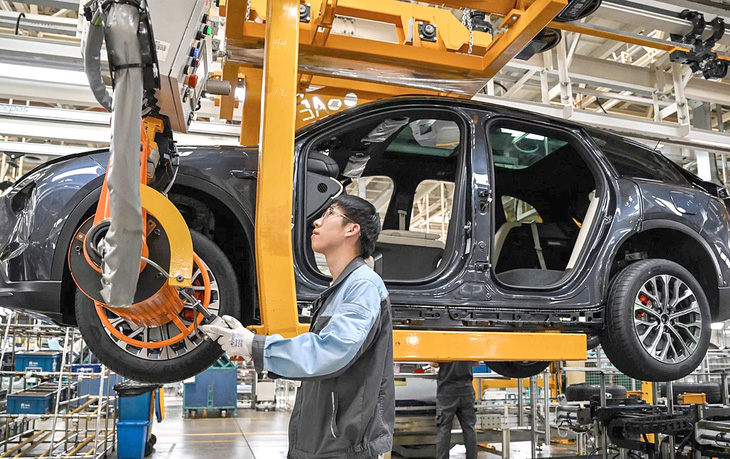
An engineer works at the NIO electric vehicle factory in Anhui province, China on May 10, 2023 - Photo: AFP


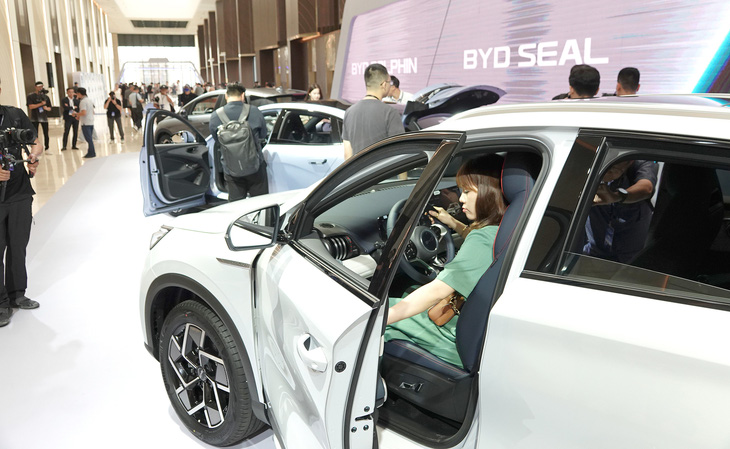
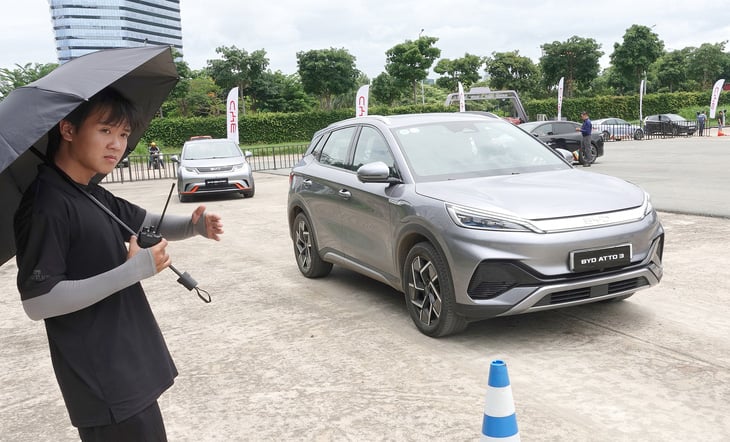
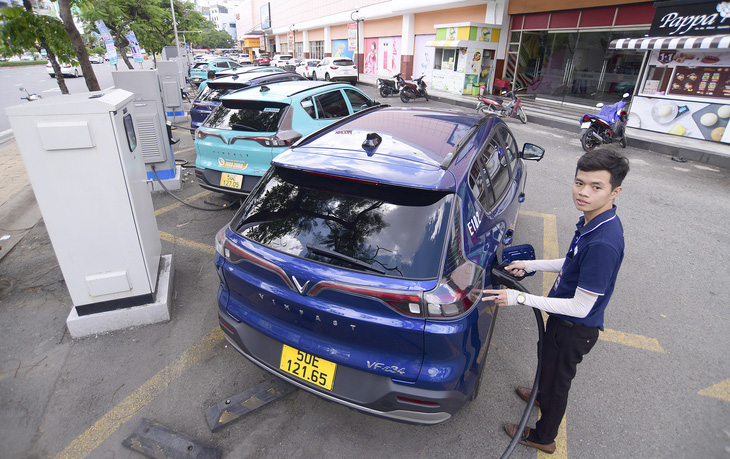
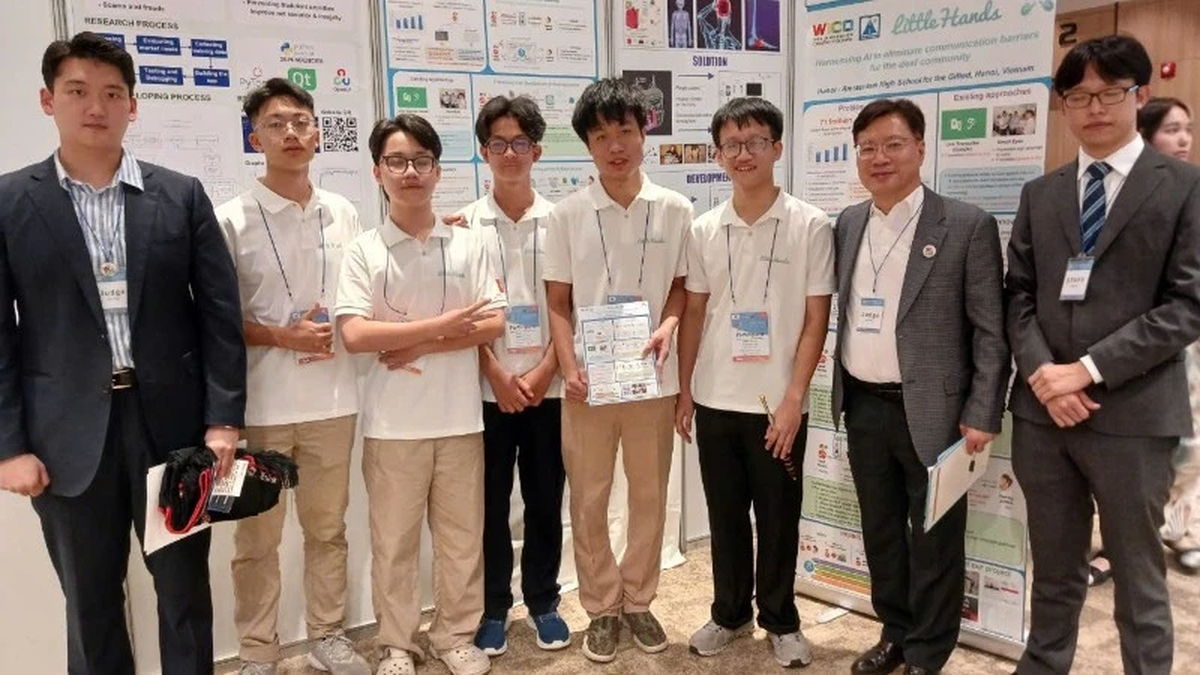






















![[Photo] National Assembly Chairman attends the seminar "Building and operating an international financial center and recommendations for Vietnam"](https://vphoto.vietnam.vn/thumb/1200x675/vietnam/resource/IMAGE/2025/7/28/76393436936e457db31ec84433289f72)








































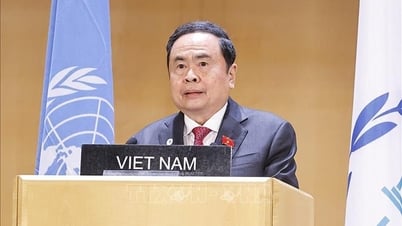





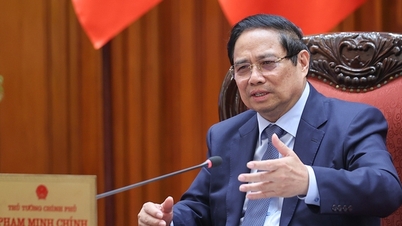

























Comment (0)